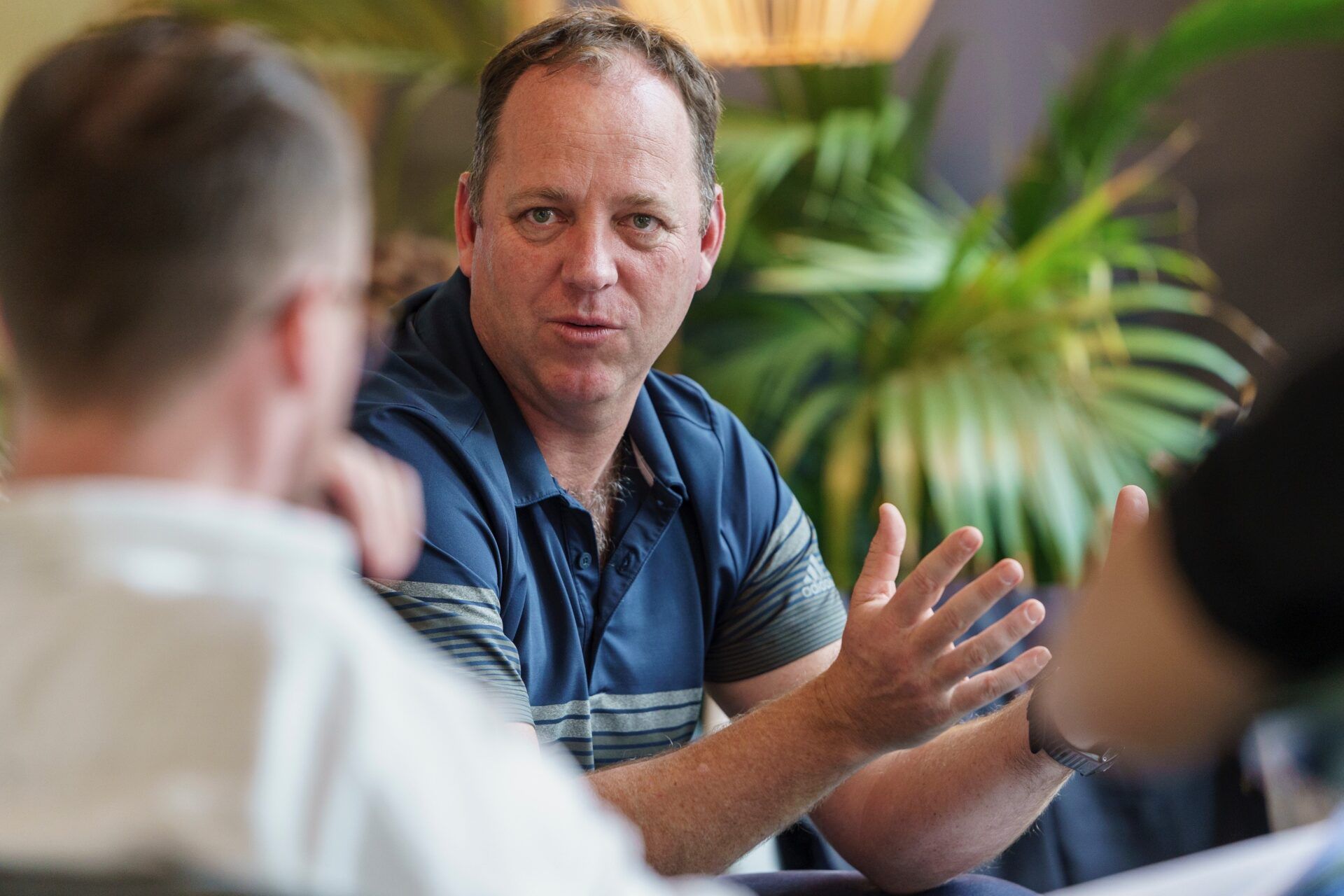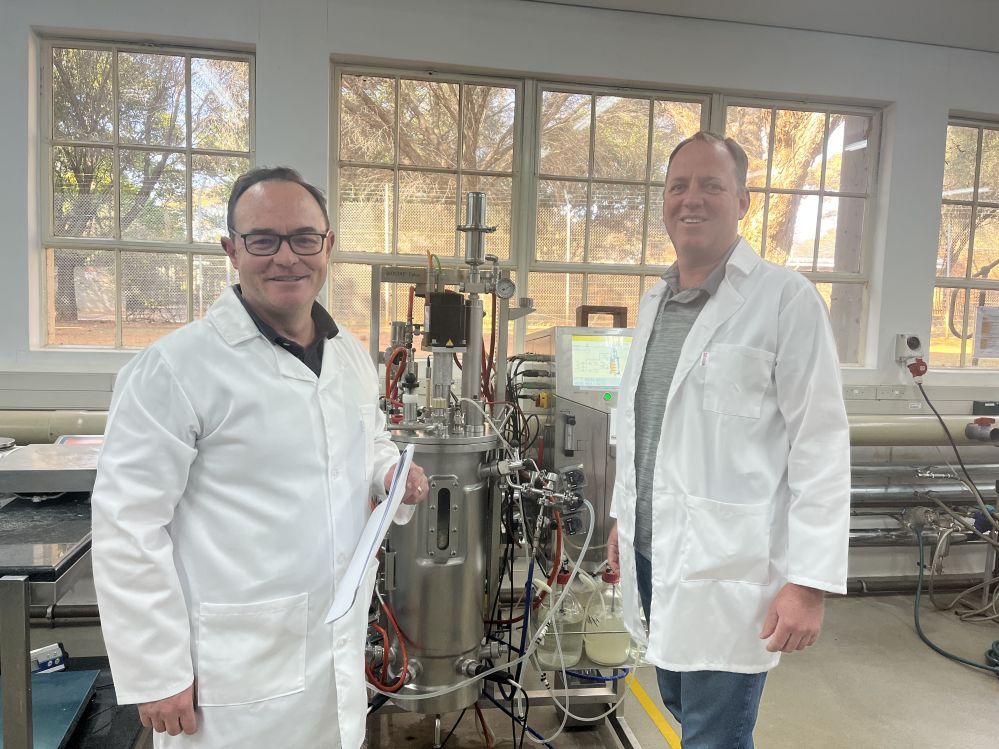Cofounded by Greg Brown (COO), James McLaren (CTO) and Charles Reed (CEO) in October 2021, South African startup MycoSure is growing protein-packed mycelium using biomass fermentation.
The startup—which jump-started its R&D process through a government-funded partnership with the Council for Scientific and Industrial Research—is now seeking seed funding after going through the ProVeg Incubator program (“almost like doing a mini-MBA for three months”).
AgFunderNews (AFN) caught up with Reed (CR) and Brown (GB) to discuss the origins story (“I bumped into Greg at our kids’ swimming lesson, of all things…”), scaling up, and the challenge of transitioning from corporate environments to startup world (“the lingo is very different…”).
AFN: Tell us about the genesis of MycoSure…
CR: It was all quite serendipitous. We [the three cofounders] have all known each other for 35-odd years as we all went to school together, but we hadn’t seen each other for a number of years.
I’d spent years in financial services working in London and Johannesburg for the likes of JP Morgan and HSBC, and a few years ago, having worked as the head of small business development for Barclays Africa, I started wondering how my skills could be used to have greater impact and purpose. So I went to work for what at the time was Africa’s largest small business impact fund, ended up back at Barclays as the head of CSR for Africa, and then decided to start my own impact fund. I’d been showcasing some interesting transactions in areas including mycelium and my old boss said to me, listen, instead of starting an impact fund, why not bootstrap one of these transactions? I then bumped into Greg at our kids’ swimming lesson, of all things, and told him about it.
GB: I’d left my role as executive director for LexisNexis South Africa and hadn’t yet decided what to do next. Charles started talking to me about mycelium and I’ll be honest, I had to go home and Google it. And then someone else mentioned mycelium in Cape Town a few weeks later, and I came back to Charles and said, I’m really interested.
So we started exploring mycelium as a technology, although at that point, we hadn’t yet decided to focus on food, and then we spoke to James (CTO James McLaren), who is a mycologist by trade, so he’s always been into mushrooms. Before he joined us, he was the technical executive of Africa’s largest mushroom grower [Denny’s Mushrooms].
A few weeks later, we decided to form a company.
AFN: How do you grow your fungi?
CR: We use biomass fermentation, which as a technology has moved beyond the bleeding edge to the leading edge, so it’s fairly well understood, although there is a lot of white space for innovation. We’re using submerged fermentation [growing mycelium in liquid in bioreactors rather than solid state fermentation], which we think creates a much more controlled environment.

AFN: How do you scale up fermentation without breaking the bank?
CR: We have a very strong technical partner here locally in the [government-funded] CSIR, the Council for Scientific and Industrial Research. Their mandate in South Africa is to support growth of the economy and particularly small businesses through their research and innovation capabilities. So straight off the bat, we were able to work with a technical partner that can go all the way through to 1,000 liter bioreactor capacity, which is kind of around the technical readiness level of six, which is significant, as when we spoke to our fellow cohort members [in the summer 2023 cohort at incubator ProVeg], we saw the struggles people were having to get access to much smaller reactors.
So we had a very sound technical partner that could get us to our feasibility and our techno-economics report stage in house.
GB: The CSIR has amazing equipment, so being able to access their R&D team and equipment meant we didn’t need to raise capital to fund our own equipment and team.
CR: So from a commercial perspective, it’s obviously an advantage that that piece of work [scaling up to the 1,000-liter stage] is funded by the government, and is quite a significant benefit when we talk to investors. Our Rand cost base also means that our R&D and operational costs are significantly cheaper than the US and Europe.
AFN: What is the product coming out of your bioreactor?
CR: We’ve just gone into 30-liter bioreactors, but we are a few months away from being able to say this is exactly the nutritional profile of what we’ll be producing commercially.
We’re targeting b2b ingredients with a high-protein, light-colored powdered product, without the off notes that you get with traditional alternative proteins. But we’ve also had conversations with potential offshore partners who are interested in the wet product coming out of the bioreactor, so we’ll explore both.
As for ingredients, the CSIR also has significant complementary capabilities, both in terms of formulations and applications, and the plan is to work with food and beverage partners’ food tech teams and target our formulations based on what they need.
GB: We’re looking at things including freeze drying, different heat drying techniques, spray drying to understand the impact they have on the final product and then we can make commercial decisions that are demand-led.
AFN: What’s the protein content of your fungi?
CR: We’re targeting 60-70%, as I say, we have four strains of which two are now at the 30-liter stage, so we need to determine which one grows faster, which one has the best protein, and so on.
AFN: Are you concerned that the alt protein market is cooling off in some markets, just as you’re getting started? How are investors looking at this space?
GB: Obviously interest rates are higher at the moment, so that naturally takes a little bit of the funding out of the ecosystem. I think a couple of years ago, before we were involved, funding was quite readily available and there were additional players in the market who were sector agnostic and just chasing the next big unicorn.
Our reading of it is that there’s a lot of portfolio realignment going on, but at our demo day in Berlin with ProVeg in late June, mycelium-based biomass fermentation was a space that funders still felt confident about, as it’s a proven technology, and the numbers make commercial sense. It’s also notable that Quorn is now going into the b2b ingredients space, and big facilities have been funded in the Netherlands.
Mycelium seems to be ticking the boxes in terms of the flavor and the protein content, whereas a lot of the plant-based ingredients still have issues.
What we’re also seeing here in South Africa is that a lot of our plant-based ingredients are still imported, so obviously they’re expensive. We also import a lot of whey products, so we are competing with very expensive ingredients.
AFN: How soon might you have a product you could take to market?
GB: I’d say at the end of Q1 next year, we should have completed our proof of concept on the protein, and that’s taking one strain to 1,000 liters, and off the back of that we’ll have a full technology transfer and a techno economic analysis. In the meantime, we’re raising our seed round.
CR: Because we can leverage the equipment and the team at the CSIR, we’ll be able to produce enough product to work with commercial partners, fine tune formulations and applications and fingers crossed we’ll be able to move into a series A with offtake commitments from existing partners.
AFN: What was the experience of working with the ProVeg incubator like?
CR: They chose 12 startups from applications from 42 countries, and we are the first South African startup they’ve ever chosen to work with and only the second from Africa.
Greg and I are not young! We’ve been in the commercial world for a long time, so there was a bit of trepidation as to what the value would be, but we met people that are brilliant in their particular fields of expertise. The ProVeg team was also really supportive and added a lot of technical value, so we took a lot of learnings out of it, just in terms of how we position ourselves as a business.
Coming from the corporate world, it’s a very different lingo vs the startup world, and we also had a lot of exposure to funders, equipment manufacturers, and legal firms talking to us about regulation in Europe versus the US, versus Singapore, for example… things that otherwise would have taken a lot of time and or money for us to get our heads around.
GB: Charles, James and I all come from big corporate entities, where if you needed something on the regulatory side, you’d just check with your legal department. You can’t do that in a startup. So for us, it was almost like doing a mini-MBA for three months.
AFN: Which markets do you plan to target?
CR: South Africa is our beachhead market, although we also have ambitions to go Pan African and globally. There is a significant local market [in South Africa] for imported ingredients like high-end plant-based proteins and concentrated whey, which are going into everything from protein shakes to baked goods.
For us, it’s about high-quality concentrated protein, and being able to use that as an ingredient and of course, to be able to produce that at the right scale, quality and consistency that we can supply a multinational food and beverage company.
We spend a lot of time talking to local and international food and beverage suppliers and manufacturers and there’s huge interest in protein security and clean label. All of the big food and beverage companies have a mandate to look at alternative protein sources.
From a regulatory perspective, South Africa would be the first market, and then the US and Singapore to follow. But it depends on the fungi strains you use, so for example ENOUGH uses the same fungi strains as Quorn, which makes the regulatory path easier.
We’re working with four strains at the moment, and one will progress into the 1,000 liter-scale.
AFN: Tell us about your funding requirements…
CR: We’re looking to raise $700,000, which would give us a 20-month runway, but I would add that our pre-seed was fully funded by the South African government and it covers the full cost of our R&D work at the CSIR. Paradoxically, when you ask for $700k, some investors say ‘Oh this is a micro-business,’ and then we show them our facilities and they’re blown away.





